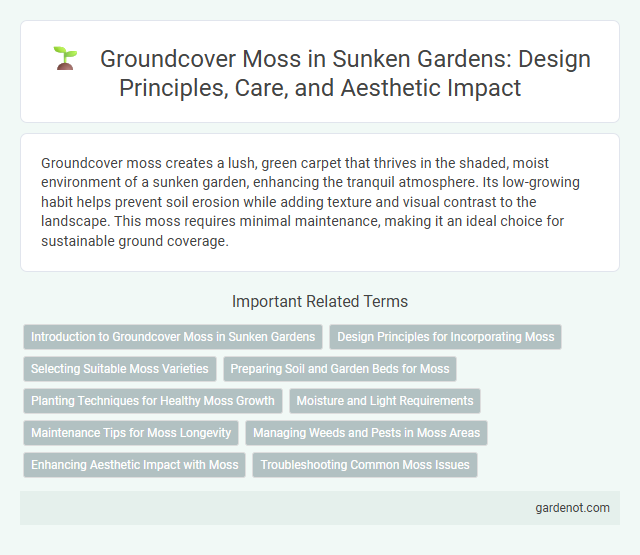Groundcover moss creates a lush, green carpet that thrives in the shaded, moist environment of a sunken garden, enhancing the tranquil atmosphere. Its low-growing habit helps prevent soil erosion while adding texture and visual contrast to the landscape. This moss requires minimal maintenance, making it an ideal choice for sustainable ground coverage.
Introduction to Groundcover Moss in Sunken Gardens
Groundcover moss in sunken gardens provides a lush, soft green carpet that thrives in shaded, moist environments, enhancing the garden's natural aesthetic. Its low-growing, dense mat helps prevent soil erosion and retains moisture, making it an ideal choice for shaded sunken garden floors. Popular moss varieties like Hypnum, Dicranum, and Polytrichum contribute to biodiversity and create a serene, tranquil atmosphere in these specialized garden spaces.
Design Principles for Incorporating Moss
Groundcover moss enhances the sunken garden's aesthetic by providing a soft, lush carpet that thrives in shaded, moist environments. Design principles include selecting moss species compatible with soil pH and light exposure, ensuring proper surface preparation for even moss establishment, and integrating moss with stone pathways or water features to create natural transitions. Consistent moisture maintenance and avoiding foot traffic preserve moss vitality, resulting in a serene, low-maintenance groundcover that complements the garden's tranquil ambiance.
Selecting Suitable Moss Varieties
Selecting suitable moss varieties for a sunken garden involves considering factors such as moisture levels, shade tolerance, and soil acidity to ensure optimal growth. Commonly recommended groundcover mosses include Hypnum cupressiforme for dry, shaded areas and Sphagnum species for consistently moist conditions. Incorporating diverse moss types enhances the garden's texture, resilience, and natural aesthetic appeal.
Preparing Soil and Garden Beds for Moss
Preparing soil and garden beds for groundcover moss requires creating a moist, acidic environment with a pH between 5.0 and 6.0, which promotes optimal moss growth. Clear the area of debris, compact the soil lightly to ensure stability, and remove any weeds or grass to reduce competition. Incorporating organic matter such as peat moss can improve soil texture and retain moisture essential for establishing a lush moss carpet in a sunken garden.
Planting Techniques for Healthy Moss Growth
Groundcover moss thrives in shaded, moist environments with well-drained, acidic soil having a pH between 5.0 and 6.0. Successful planting techniques include preparing a smooth, compacted soil surface, gently pressing moss fragments or mats onto the substrate, and maintaining consistent moisture through misting or irrigation. Avoid direct sunlight and foot traffic to ensure healthy moss growth and vibrant ground coverage in the sunken garden.
Moisture and Light Requirements
Groundcover moss thrives in consistently moist environments, requiring high humidity and damp soil to maintain its vibrant green appearance. It prefers shaded or partially shaded areas, as direct sunlight can cause desiccation and inhibit growth. Optimal conditions include indirect light with protection from intense midday sun to ensure healthy development and longevity.
Maintenance Tips for Moss Longevity
Groundcover moss requires consistent moisture to maintain its lush appearance, so regular misting or light watering is essential, especially during dry periods. Removing debris and controlling foot traffic helps prevent damage and compaction, ensuring healthy moss growth. Applying a thin layer of organic mulch can protect the moss from extreme temperatures and retain soil moisture for enhanced longevity in sunken gardens.
Managing Weeds and Pests in Moss Areas
Managing weeds and pests in groundcover moss areas requires regular monitoring and careful manual removal to prevent damage without harming the delicate moss. Using organic herbicides or natural predators helps control invasive species while maintaining a healthy moss ecosystem. Ensuring proper moisture levels and avoiding excessive foot traffic reduces stress on the moss, minimizing vulnerability to pests and weed invasion.
Enhancing Aesthetic Impact with Moss
Groundcover moss creates a lush, vibrant carpet that enhances the Sunken Garden's aesthetic appeal by adding rich textures and deep green hues. Its ability to thrive in shaded, moist environments ensures consistent coverage, complementing stone pathways and water features seamlessly. Moss's low maintenance and natural elegance transform the garden into a tranquil, timeless landscape.
Troubleshooting Common Moss Issues
Groundcover moss often faces challenges such as discoloration, patchiness, and slow growth caused by insufficient moisture, poor soil drainage, or exposure to direct sunlight. Addressing these issues requires maintaining consistently moist, acidic soil with good aeration and ensuring the moss receives filtered or indirect light to promote healthy, vibrant growth. Regularly removing debris and avoiding heavy foot traffic prevents damage and supports the moss's ability to thrive in sunken garden environments.
Groundcover moss Infographic

 gardenot.com
gardenot.com